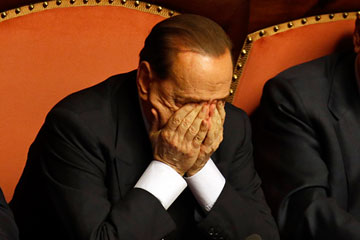
Berlusconi in the Italian Senate on Oct. 2, after his attempt to topple the government failed.
The Sunday after Prime Minister Enrico Letta survived an Oct. 2 attempt by Silvio Berlusconi to bring down his government, Letta went on television to declare victory. "I think a political season has been closed," he said, referring to the country's nearly 20 years of political domination by the sex-scandal-plagued former Prime Minister. "The page has been securely turned."
Letta is not the first leader to prematurely declare mission accomplished. The Prime Minister has fractured Berlusconi's political party, forced him into humiliating surrender on national television, and all but ensured that later this month he will be booted from the Senate, a punishment for the one-year sentence for tax fraud Berlusconi received in August. But it's far too early to declare him politically dead and gone. Whatever his faults, Berlusconi's recurring political success reflects an enduring failure of Italian politics: its inability to deliver durable results. And on that front, there's little reason to believe anything has changed.
Since his entrance into politics in 1994, Berlusconi has occupied the space where a national battle for ideas should be taking place. Even as the Italian economy flatlined and contracted, there has not been a serious debate about political vision or ideology — no tussle between left and right, no face-off between Catholic and communist. Instead, there has been a constant, damaging melee between supporters and opponents of the flamboyant media mogul. Berlusconi's allies have included conservative Catholics, secessionist xenophobes and hard-right nationalists. Those arrayed against him have ranged from old-school communists to fervent proponents of the free market. When the two sides aren't battling each other for power, they're consumed with internal struggles over what to do with it.
The last time it seemed the page had been turned was two years ago. The rapidly accelerating euro crisis had escalated fears of an Italian default, capsizing the government of which Berlusconi was then the Prime Minister. Crowds celebrating his ouster in Rome were treated to an impromptu performance of the "Hallelujah Chorus" from Handel's Messiah by a hastily assembled orchestra of demonstrators.
But it didn't take long for Berlusconi to reboot. As the economy spiraled downward, Italy first turned to Mario Monti, an austere professor of economics, who promised salvation through spending cuts, tax hikes and reforms. Monti balanced Italy's books, but his government lasted just over a year, before Berlusconi brought it down. The country then made a U-turn, voting in large numbers in elections in February for Beppe Grillo, a bellicose comedian who promised to upend the political order. For two months, as the hung Parliament struggled to form a government, it seemed he might succeed. Then Berlusconi offered Letta his support, and Grillo found himself blocked out.
The door won't truly close on the Berlusconi era unless Letta can deliver a major economic and administrative overhaul. The country's problems are well documented: a burdensome public bureaucracy, a sluggish judicial system, taxes that are among the highest in the world, government services ranked among the lowest in Europe, an unbalanced economy tilted toward the old at the expense of the young. Years of attempted reforms have failed thanks to political divisions and the power of special interests. Letta's survival depends not just on his own fractious party, but also on a large portion of Berlusconi's, making his chances of success slim.
And Berlusconi will be waiting to pounce. Weakened or not, he remains one of Italy's most formidable politicians, with a large personal war chest, control of much of his country's media and an uncanny ability to measure the Italian political pulse. Already, he is piecing together his broken party, reaching out to his dissident lieutenants. He will most likely pay the societal debt incurred by his one-year sentence for tax fraud not in jail but through community service in a dignified office job. That will leave him free to continue leading his party, and allow him to launch a new assault as early as Letta's first difficult vote.
In that sense, Letta may have been right: Italian politics has reached a season finale. The trouble is that he's likely to see some familiar faces in the next episode. The question is, Does Letta have what it takes to play a leading role, or will he be just another temporary foil for the real star of the show?
